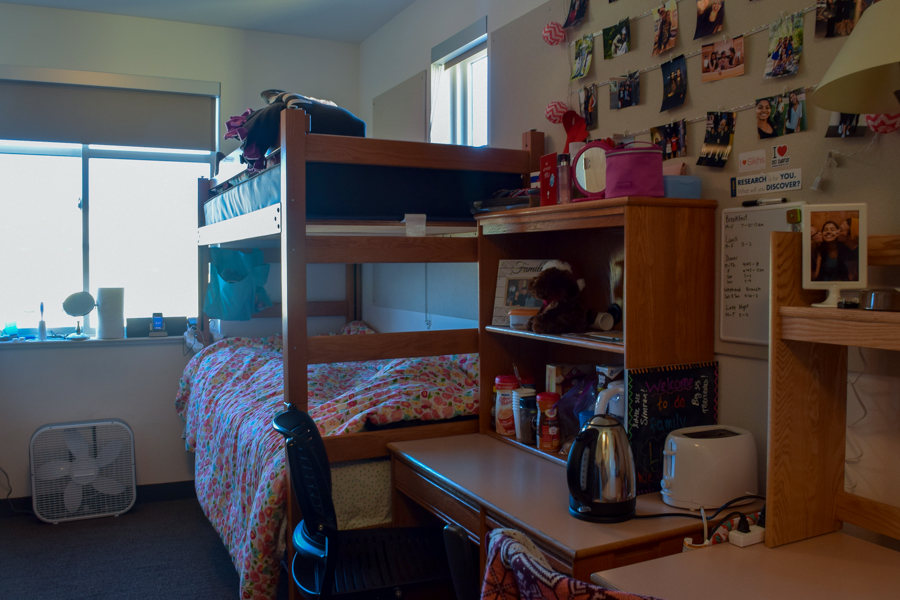
(DEBPARNA PRATIHER / AGGIE)
Initiative to add 14,000 beds to student housing across all UC’s
On Jan. 20, University of California (UC) President Janet Napolitano issued the UC’s new Student Housing Initiative with the intentions of accommodating the future enrollment influx, accelerating student housing development and keeping housing affordable.
Influenced by admission targets, Napolitano set to increase system-wide admission of 10,000 new in-state undergraduates within the coming three years, including 5,000 incoming freshmen and transfer students in the 2016-17 school year.
Napolitano plans on adding roughly 14,000 new beds in the next couple of years including more beds in the residence halls, increased graduate student housing and more university apartments for the general populace.
“I think it’s exciting,” said Emily Galindo, executive director of Student Housing. “I think that because we want to grow and be sure that we can accommodate as many California residents as possible […] then you need to have facilities to accommodate them and a key facility is student housing.”
Though Galindo believes that off-campus housing isn’t as large of a problem in Davis, she still sees this initiative as beneficial across the UC’s.
“So many of the campuses are located where [there’s] very expensive housing in the exterior of the campus. So students often look for a place on campus to find housing more affordable,” Galindo said. “In Davis, our situation is a little different, but it can also be applied.”
Alexis Quach, a first-year economics major, believes that a growing problem at UC Davis is many first-year students are forced to live off-campus because of a lack of space, despite being promised guaranteed housing as freshmen. The initiative is intended to help house more incoming freshmen.
“I know a number of freshman that have to live off-campus because they couldn’t get housing,” Quach said. “I think it’s kind of unfair because you want that experience as a first-year and you’re open to way more resources when you’re on campus.”
For the Davis campus, the initiative focuses on the increasing incoming freshmen and transfers, rather than the continuing student body. Steps taken to fix the first-year housing shortage include the termination of guaranteed second-year housing.
“Unfortunately we’re gonna have to suspend our second-year guarantee because we want to be sure that we can accommodate all the first-years,” Galindo said.
But Galindo does not rule out supporting the continuing student body.
“In terms of continuing students, I think the campus can be responsible in how it grows,” Galindo said. “What that means is, although many students will choose to live in the city of Davis […] depending on supply, it could mean we need to supply more student housing.”
However, some students do not share the same enthusiasm for the Student Housing Initiative. For Kayla Chen, a first-year managerial economics major, the increase in students would result in potential rise in tuition.
“Having more dorms and beds would mean more students, and that would mean they would [raise] the tuition,” Chen said.
These sentiments have been expressed since the launch of the 2020 Initiative, a campaign pioneered by Chancellor Linda P.B. Katehi in November 2011 that intends to add 5,000 undergraduate students by 2020. However, since the initiative is not state-funded, a tuition hike is necessary to expand the physical capacity of the campus, including student housing.
Currently there are plans for the “Tercero Phase 4” residence halls to be completed by Fall 2017, adding four new buildings that will house 506 students total. Galindo mentions this future on-campus housing as part of the 2020 Initiative.
“We had already begun the process in figuring out how to accommodate the 2020 Initiative,” Galindo said. “What you see with Tercero is a part of what we needed for that.”
The new housing initiative, on the other hand, will assist the renovation and redevelopment of other projects on the UC Davis campus, with an emphasis on the Tercero dining commons and Cuarto residence halls.
“Right now, the next thing we would be looking at is additional dining, maybe a second dining facility in the Tercero area. It’s really packed,” Galindo said. “Out in the Cuarto area is another place where we have aging facilities. We have a plan now to redevelop Webster and Emerson and add about 300 additional beds.”
On Jan. 22, a team consisting of UC Chief Financial Officer Nathan Brostrom and senior leaders under Brostrom and Chief Investment Officer Jagdeep Singh Bachher visited all 10 UC campuses in hopes of accessing and expediting each campus’ housing objectives.
Written by: Yvonne Leong – campus@theaggie.org



